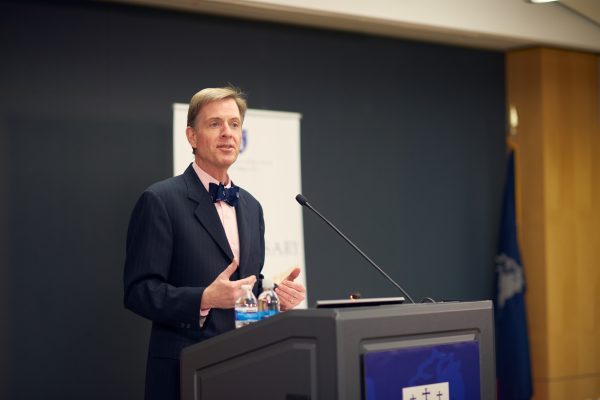Why Should We Engage?: Senior Fellow Tim Goeglein Lectures at The King’s College
Former White House aide Tim Goeglein encourages Christians to be faithful exiles upholding justice, freedom, and human dignity in a culture that has grown weary of Christian morality.

On Thursday, March 28, Senior Fellow Tim Goeglein visited The King’s College to lecture on the relevance and needfulness of Christian values in the public square. Formerly a top aide to President George W. Bush and now the vice president of external relations at Focus on the Family, Goeglein has been promoting Christian values in the public square for nearly 30 years.
Before addressing the questions of why and how Christians should enter the public square, Goeglein described the landscape of modern culture, which “continues to follow a course animated by its infatuation with personal autonomy, individual rights, and self-enhancement.” Christians may feel at odds with this trend. However, Goeglein suggests the feeling is mutual, “as those who shape American politics and culture find our Christian values as being, at best, quaint, or at worst, dangerous.” The result seems to be “an experience now common among serious Christians and our churches: being shunted out of the center of society to its margins.” In light of these realities, Goeglein encouraged the audience to consider their unique position in society.
Goeglein believes that students and faculty at King’s, who find themselves in the Financial District of one of the largest, most influential cities in the world, can answer the question of Christian engagement “because we know who we are and whose we are.” And if we know who we are, how shall we then live?
Goeglein listed the various responses Christians can have toward today’s hostile environment. Some seek ways to be less offensive. Others adopt an adversarial posture. Still others “attempt to reclaim the dominant cultural position Christians once held in United States of America.” Then there are those who suggest a return to a monastic lifestyle of communal living set apart from the world. Still others find themselves caught between the extremes Goeglein outlined, who aren’t quite certain how to live in “a world that has grown weary of Christians, their intolerant doctrines, and stifling morality.”
Though it is an axiom Christians are familiar with, Goeglein’s advice is to be in the world, not of it. The world still matters to God, so it should matter to Christians as well. And without Christian influence in the public square, Goeglein argued, the values of justice, freedom, human dignity, and equality will not be reflected in the law and in culture.
In his decades of experience with politics in Washington, D.C., Goeglein has encountered many “white hot debates” in which Christians must be involved. He cited New York State’s recent abortion laws and the newly re-introduced Equality Act as examples of current issues that are directly related to Christian values of human dignity and religious liberty.
While the current cultural climate may seem dire, Goeglein encouraged students and faculty not to despair, saying, “Despair and discouragement negate the hope that we have in Jesus Christ.” He explained that the Christian’s duty is to be a faithful exile rather than pursuing professional success. Their calling is far more valuable and difficult: “to be obedient, to be speak the truth, to be graceful, magnanimous, diplomatic, yet unapologetic about their beliefs.”
In summary, Goeglein quoted Father Richard John Newhouse: “Against the encroaching shadows of the culture of death, we renew our resolve that we shall not grow weary, we shall not rest, until the culture of life is reflected in the rule of law and lived in the law of love. It has been a long journey, and there are still miles and miles to go.” Goeglein asked students and faculty to engage in culture “with joy, conviction, and the love and dignity and the beauty of our Lord and Savior Jesus Christ.”
The lecture was followed by a Q&A session. It was attended by King’s students and visitors.




